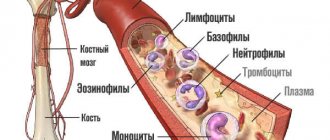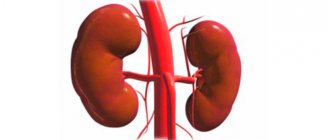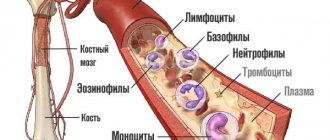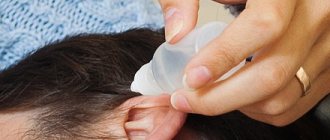- significant reduction in daily urine production. The condition does not qualify as an independent disease and is considered one of the first signs of acute renal failure. Other possible causes of oliguria include dehydration, urinary tract obstruction, hypovolemic shock, and medications. Lack of treatment leads to serious health problems.
Oliguria is diagnosed when urine production in newborns is less than 1 ml/kg/hour, in boys and girls less than 0.5 ml/kg/hour and in adults less than 400 ml per day. A significant and consistent decrease in the amount of urine excreted is a reason to make an appointment with a urologist or gynecologist. A complete absence of urine or a decrease to 50 ml per day is called anuria.
Causes of oliguria
Physiological oliguria often develops during pregnancy due to compression of the ureters by the enlarging uterus and increased tissue hydrophilicity. Physiological oliguria in children in the first days of life is a feature of the neonatal period.
False oliguria is caused by two reasons:
- insufficient fluid intake into the body;
- increased consumption of fluid by the body, for example, with increased sweating in the hot season, during sports, etc.
More often, false oliguria is caused by a combination of causative factors, i.e. increased consumption of fluid by the body when its supply is insufficient.
False oliguria can occur due to intense physical activity and limited fluid intake.
False oliguria is often caused by mental factors, for example, a diet with a targeted reduction in the amount of fluid consumed (psychogenic oliguria). In some cases, it can be iatrogenic - due to medical necessity, for example, fluid intake is reduced in case of late toxicosis (preeclampsia) of pregnant women, nephrotic syndrome, pancreatitis.
Another cause of false oliguria may be the release of urine in an unnatural way, which is observed when a bladder tumor is perforated or an artificial urinary drainage route is imposed from the kidney (nephrostomy).
Normally, the daily amount of urine in an adult is 1-1.5 liters. This indicator varies depending on a person's age, gender, weight, diet and amount of fluid consumed.
The development of false oliguria in children is facilitated by long walks, too warm clothes, and high air temperature in the room where the child remains for a long time.
False oliguria can turn into true oliguria.
The reasons contributing to the development of oliguria are divided into three main groups:
- prerenal;
- renal;
- postrenal.
Prerenal causes include:
- blood loss;
- burns;
- infectious diseases;
- diseases of the cardiovascular system;
- intestinal obstruction;
- prolonged diarrhea;
- repeated vomiting;
- profuse sweating;
- prolonged fasting.
Renal (renal) causes of oliguria:
- acute renal failure;
- poisoning with nephrotoxic substances;
- severe kidney injury;
- hemolytic syndrome;
- glomerulonephritis;
- acute pyelonephritis;
- blockage of the renal veins;
- side effects from taking medications.
Postrenal causes of oliguria include:
- bladder cancer;
- prostatitis;
- blockage of the urinary tract (stones, tumors, blood clots, etc.);
- strictures (narrowing) of the urethra;
- injury to the urinary tract during childbirth; etc.
Prostatitis can cause oliguria in men
Pathological oliguria can also develop due to narrowing of the pylorus of the stomach (pyloric stenosis), acute inflammation of the small and large intestines, intestinal obstruction, and high fever.
Forms
Oliguria is usually divided into several types:
- physiological, caused by hot weather or increased sweating;
- pathological (true), associated with urinary disorders;
- false, occurring without impairment of renal function.
In addition to insufficient diuresis, kidney disease can be accompanied by anuria, polyuria and nocturia. In the first case, the daily amount of urine drops to 50–70 ml, while urine from the kidneys does not enter the bladder at all. With polyuria, much more fluid leaves the body than is drunk. The daily volume of urine can exceed 1.8–2.0 liters.
Oliguria is often accompanied by nocturia, manifested by frequent trips to the toilet at night.
Symptoms of oliguria
The main symptoms of oliguria are a decrease in the amount of urine excreted to less than 400 ml per day (less than 20 ml per hour) and signs accompanying the developing disturbance of water-salt balance. This condition also provokes an exacerbation of the symptoms of the underlying disease. In addition to the actual decrease in the amount of urine, oliguria is characterized by the following manifestations:
- hematuria;
- decreased blood pressure;
- increased body temperature, fever;
- nausea, vomiting;
- diarrhea;
- pain in the lower back and/or abdomen;
- pain and/or pulling sensations during urination;
- the appearance of edema.
With oliguria, the amount of urine excreted is reduced to 400-500 ml per day.
A decrease in the amount of daily urine due to insufficient fluid intake, increased sweating, as well as for a number of other reasons that may explain the decrease in daily diuresis is the main symptom of false oliguria. This condition is accompanied by dry mouth, dizziness, deterioration in general health, weakness, and intense thirst.
How does this pathology manifest itself?
The main sign of this phenomenon is a decrease in the volume of urine excreted by the patient per day. A condition in which a person notices a slight decrease in urine output is not considered oliguria if the person being studied does not have a feeling of discomfort or any other health changes. In this case, a man or woman can even independently determine the possible causes of the disorder - excessive sweating, insufficient drinking regimen. The appearance of a small amount of discharge in such a situation becomes a normal, physiological phenomenon.
A downward change in diuresis causes the patient to develop corresponding clinical signs. The following symptoms of oliguria are distinguished:
- nausea accompanied by vomiting;
- feeling unwell, lethargy, drowsiness;
- the appearance of bloody impurities and large clots in the urine;
- elevated temperature;
- stool disorders (diarrhea);
- chills and fever;
- pain in the lower abdomen (radiates to the back, lower back);
- Blood pressure levels drop sharply.
Such symptoms are characteristic of oliguria, which itself often becomes a manifestation of some illness. A decrease in the amount of fluid secreted in this case is usually accompanied by signs of pathology corresponding to this disease.
Good to know! The symptoms of oliguria should not be confused with dysuria, a condition in which the patient feels the bladder is full and cannot empty it. When the daily volume of urine decreases, it does not accumulate in this organ, and therefore the person does not feel the desire to go to the toilet.
Diagnostics
In order to diagnose oliguria, a medical history, a general blood test, and a physical examination are performed. Collecting anamnesis and identifying the factors preceding the appearance of oliguria make it possible to differentiate true from false oliguria.
A functional urine test is performed if pathological oliguria is suspected.
If pathological oliguria is suspected, a laboratory and instrumental examination is carried out, which, according to indications, includes:
- general and biochemical blood test;
- general and biochemical urine analysis;
- functional urine tests (Zimnitsky test, Nechiporenko test, etc.);
- determination of circulating blood volume;
- ultrasound examination of the kidneys and urinary tract;
- computed tomography with contrast agent or magnetic resonance imaging of the abdominal cavity and pelvis;
- radionuclide study of the morphofunctional state of the kidneys and urinary tract;
- electrocardiogram;
- diuretic test.
Treatment of oliguria
Treatment of oliguria is aimed at restoring water and electrolyte balance, normal blood circulation and correcting developed disorders. Subsequently, therapy is carried out for the underlying disease that caused the development of this condition.
In some cases, hospitalization of the patient and intravenous administration of balanced salt solutions is necessary. In particularly severe cases, hemodialysis may be required.
In the prerenal form of the disease, adult patients are advised to take diuretic drugs. However, until the reasons for the development of oliguria are established, the method of forced diuresis is not used.
If renal perfusion is impaired, blood pressure is normalized to correct it, and vasodilators are used if necessary.
Severe oliguria may require hemodialysis
For oliguria of infectious etiology, antibacterial therapy is indicated. The choice of drug depends on the type of the main infectious agent detected during the diagnostic process and the results of the antibiogram.
Self-medication of oliguria with drugs is dangerous due to changes in clinical urine parameters, which can lead to erroneous diagnosis.
In some cases (with acute pyelonephritis, glomerulonephritis, etc.), in addition to drug treatment, a diet is prescribed - table No. 7 according to Pevzner.
In case of postrenal form of pathology, surgical treatment is indicated.
False oliguria is characterized by a physiological decrease in diuresis due to reasons not related to the pathology of the internal organs.
To eliminate false oliguria, it is enough to replenish the required level of fluid in the body. The most suitable solutions for this are saline solutions, for example, Regidron solution or slightly salted water (they allow you to quickly normalize the water-salt balance). You should not drink tonic drinks (strong tea, coffee, tonics), because although they increase urination, this occurs due to even greater dehydration of the body.
Effective Treatment Options
The patient’s task is to pay attention to negative symptoms in a timely manner, to prevent dehydration of the body or excessive accumulation of fluid. They do not treat oliguria (this is a symptom), but a disease that interferes with the formation of urine.
Depending on the type of pathology, doctors prescribe:
- antibiotics to eliminate the inflammatory process,
- diuretics to reduce swelling,
- blood thinners for renal artery thrombosis,
- cystostatics in the development of glomerulonephritis,
- antidote substances for intoxication,
- Hemodez solution to eliminate the negative consequences of intoxication and shock.
Learn about the beneficial properties of cranberries for the kidneys and the medicinal uses of the berry.
The rules for using the antibiotic Palin for inflammation of the bladder are described on this page.
Go to https://elesto.ru/bolezni/simptomy/bolyat-pochki-y-zhenshhin.html and read about why kidneys hurt in women and how to get rid of pain.
Other treatments:
- correction of the drinking regime if deviations in the volume of liquid consumed are detected,
- in case of renal failure, filtration blockage, hemosorption or hemodialysis is prescribed,
- in case of heart failure, arrhythmia, bradycardia, tachycardia, it is necessary to take medications that support myocardial strength,
- in case of active accumulation of fluid, problems with urine excretion, or bladder overflow, catheterization is performed to remove stagnant urine,
- In case of mechanical blockage of the ducts by a tumor or stone, surgical treatment is performed. Emergency surgery is often required.
Folk remedies and recipes
Many patients are interested in whether it is possible to take herbal infusions for oliguria? Doctors recommend that all treatment methods be coordinated with a urologist. If you are only concerned about a decrease in the volume of urine excreted, and there are no other signs indicating the development of dangerous pathologies, then you can take a course of herbs that improve urination. Medicinal plants normalize the outflow of urine and reduce signs of intoxication.
Useful plants:
- gentian root,
- plantain seeds,
- a mixture of buttermilk and parsley solution,
- corn silk,
- juniper berries,
- bearberry,
- hop cones,
- pharmaceutical camomile.
Helpful Tips:
- you need to calculate how much fluid you received per day: water + tea + soup + juice + compote and so on, compare how much urine is excreted (empty your bladder into a prepared container to measure daily diuresis). Perhaps there is a violation of the drinking regime: the volume received is less than the standard. With a lack of water, excessive sweating in hot weather, dehydration can develop, which can lead to dangerous complications,
- An important point – the duration of therapy using herbal infusions and natural teas – is 3–5 days. If during this period daily diuresis is not restored, then an in-depth examination is required to determine the cause of the deviations.
Prevention
The main measures to prevent oliguria include:
- timely treatment of diseases of the urinary system and other diseases of internal organs;
- Immediately consult a doctor if you suspect a decrease in the amount of urine excreted;
- drinking enough liquid;
- refusal of self-medication with medications.
For physiological oliguria in pregnant women, preventive measures are selected individually by the doctor monitoring the pregnancy. Such measures include control of fluid and salt intake, systematically applied semi-fasting days, etc.
To prevent false oliguria, you need to monitor your water intake during exercise.
To prevent false oliguria, you should monitor the daily amount of fluid consumed, increasing it if necessary depending on conditions, including the volume and intensity of physical activity.
Therapy in children
Immediately after birth, newborns experience physiological oliguria. This is a completely normal condition for a small child. But if the symptom lasts longer than 14 days, there is cause for concern.
In addition to the physiological condition, insufficient urination can be caused by non-compliance with the drinking regime or loose stools.
False oliguria in older children often develops due to long walks in the heat, excessive activity, and too warm clothing. The causes of the pathological condition in children are the same as in adults.
A feature of the treatment of oliguria in newborns is the refusal to use diuretics. To prevent dehydration due to vomiting or severe diarrhea, a young child requires hospital treatment using IVs.
Consequences and complications
In the absence of timely and adequate treatment, oliguria can lead to a complete cessation of urine output (anuria), which poses an immediate threat to life.
Uncontrolled use of diuretics by patients with oliguria can contribute to the development of acute renal failure, which is also highly likely to cause death.
Oliguria in nephrotic syndrome indicates the severity of the patient's condition - the less urine produced during the day, the more severe the kidney condition. Severe oliguria is dangerous because damaged kidney tissue may not recover even after correction of the condition, and the patient will require hemodialysis or a kidney transplant.











